Mercedes EQS SUV VS Hyundai Staria – Specs, Efficiency & Price Comparison
Which model is the better choice – the Mercedes EQS SUV or the Hyundai Staria? We compare performance (658 HP vs 225 HP), boot capacity (645 L vs 831 L), efficiency (19.60 kWh vs 7.60 L), and of course, the price (95000 £ vs 41200 £).
Find out now which car fits your needs better!
The Mercedes EQS SUV (SUV) is powered by a Electric engine and comes with a Automatic transmission. In comparison, the Hyundai Staria (Bus) features a Full Hybrid engine and a Automatic gearbox.
When it comes to boot capacity, the Mercedes EQS SUV offers 645 L, while the Hyundai Staria provides 831 L – depending on what matters most to you. If you’re looking for more power, you’ll need to decide whether the 658 HP of the Mercedes EQS SUV or the 225 HP of the Hyundai Staria suits your needs better.
There are also differences in efficiency: 19.60 kWh vs 7.60 L. In terms of price, the Mercedes EQS SUV starts at 95000 £, while the Hyundai Staria is available from 41200 £.
Compare all the key specs now and find out which model fits your lifestyle best!
Mercedes EQS SUV
The Mercedes-Benz EQS SUV redefines luxury in the electric vehicle segment with its elegant design and cutting-edge technology. Its spacious interior provides exceptional comfort, featuring high-quality materials and innovative ambient lighting to create a serene driving environment. This SUV impressively combines sustainability with performance, offering a smooth and quiet ride without compromising on power.
details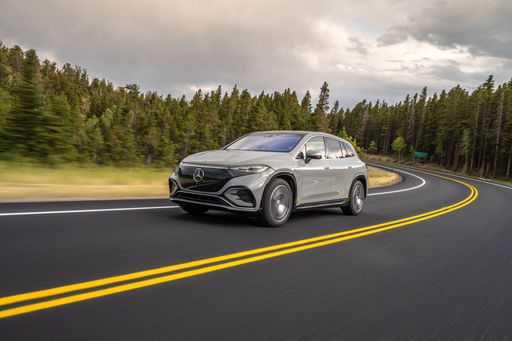 @ group-media.mercedes-benz.com
@ group-media.mercedes-benz.com
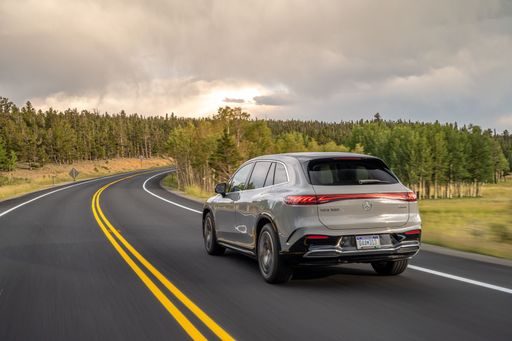 @ group-media.mercedes-benz.com
@ group-media.mercedes-benz.com
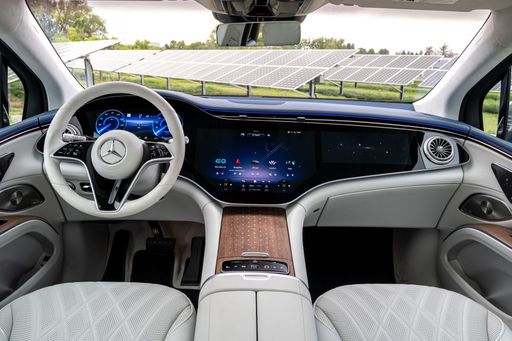 @ group-media.mercedes-benz.com
@ group-media.mercedes-benz.com
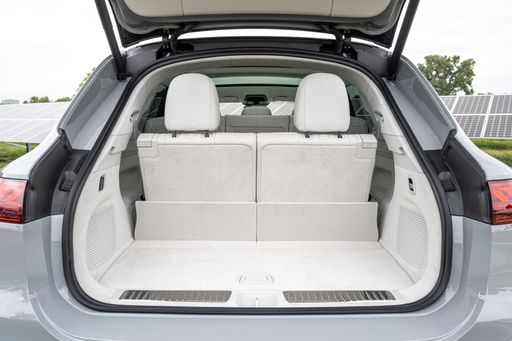 @ group-media.mercedes-benz.com
@ group-media.mercedes-benz.com
Hyundai Staria
The Hyundai Staria stands out with its futuristic design, characterised by sleek lines and an expansive front grille that makes a bold statement on the road. Inside, it offers a spacious and versatile interior, providing a comfortable ride for both driver and passengers. This vehicle effortlessly combines practicality with a touch of luxury, appealing to families and professionals alike.
details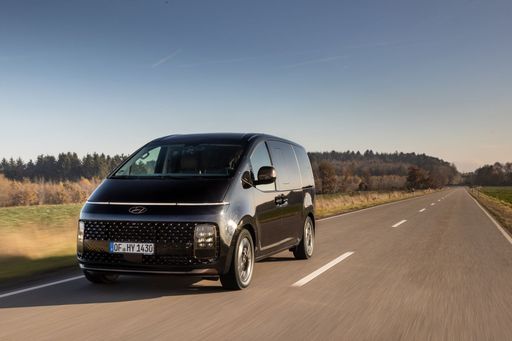 @ hyundai.news
@ hyundai.news
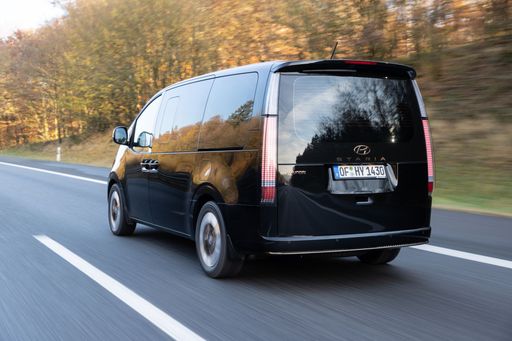 @ hyundai.news
@ hyundai.news
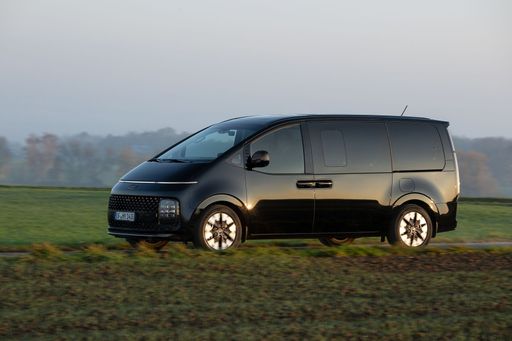 @ hyundai.news
@ hyundai.news
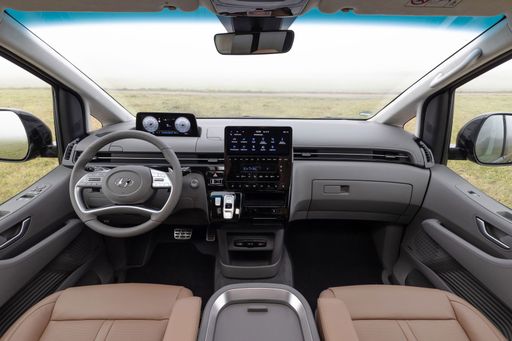 @ hyundai.news
@ hyundai.news
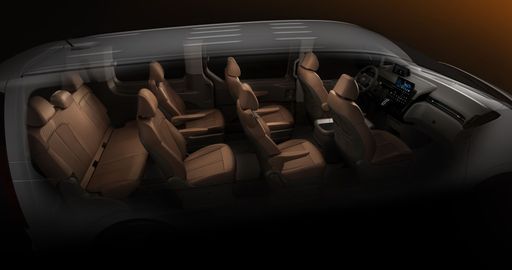 @ hyundai.news
@ hyundai.news
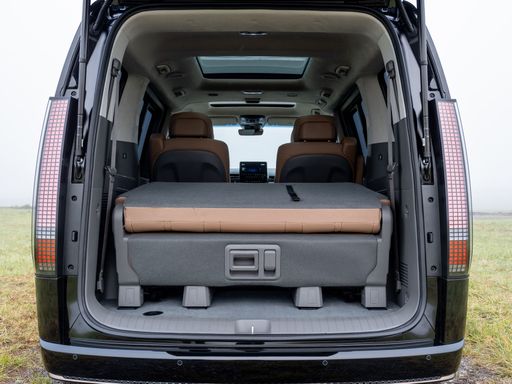 @ hyundai.news
@ hyundai.news

|

|
|
|
|
Costs and Consumption |
|
|---|---|
|
Price
95000 - 212100 £
|
Price
41200 - 49300 £
|
|
Consumption L/100km
-
|
Consumption L/100km
7.60 L
|
|
Consumption kWh/100km
19.6 - 21.9 kWh
|
Consumption kWh/100km
-
|
|
Electric Range
615 - 695 km
|
Electric Range
-
|
|
Battery Capacity
108.4 - 118 kWh
|
Battery Capacity
-
|
|
co2
0 g/km
|
co2
172 g/km
|
|
Fuel tank capacity
-
|
Fuel tank capacity
65 L
|
Dimensions and Body |
|
|---|---|
|
Body Type
SUV
|
Body Type
Bus
|
|
Seats
4 - 5
|
Seats
7 - 9
|
|
Doors
5
|
Doors
5
|
|
Curb weight
2695 - 3075 kg
|
Curb weight
2275 - 2345 kg
|
|
Trunk capacity
440 - 645 L
|
Trunk capacity
117 - 831 L
|
|
Length
5125 mm
|
Length
5253 mm
|
|
Width
1959 - 2034 mm
|
Width
1997 mm
|
|
Height
1718 - 1721 mm
|
Height
1990 mm
|
|
Payload
425 - 570 kg
|
Payload
605 - 775 kg
|
Engine and Performance |
|
|---|---|
|
Engine Type
Electric
|
Engine Type
Full Hybrid
|
|
Transmission
Automatic
|
Transmission
Automatic
|
|
Transmission Detail
-
|
Transmission Detail
Automatikgetriebe
|
|
Drive Type
All-Wheel Drive, Rear-Wheel Drive
|
Drive Type
Front-Wheel Drive
|
|
Power HP
360 - 658 HP
|
Power HP
225 HP
|
|
Acceleration 0-100km/h
4.4 - 6.8 s
|
Acceleration 0-100km/h
10.20 s
|
|
Max Speed
210 km/h
|
Max Speed
167 km/h
|
|
Torque
568 - 950 Nm
|
Torque
367 Nm
|
|
Number of Cylinders
-
|
Number of Cylinders
4
|
|
Power kW
265 - 484 kW
|
Power kW
165 kW
|
|
Engine capacity
-
|
Engine capacity
1598 cm3
|
General |
|
|---|---|
|
Model Year
2024
|
Model Year
2024
|
|
CO2 Efficiency Class
A
|
CO2 Efficiency Class
F
|
|
Brand
Mercedes-Benz
|
Brand
Hyundai
|
Mercedes EQS SUV
Introduction to the Mercedes-Benz EQS SUV
The Mercedes-Benz EQS SUV stands as a testament to the capabilities of electric technology combined with luxury. Designed as an electric counterpart to its combustion-engine siblings, the EQS SUV offers opulent comfort, cutting-edge technology, and impressive performance metrics, all wrapped in a sustainable package.
Powertrain and Performance
At the heart of the EQS SUV lies a fully electric powertrain that varies across different models, offering power outputs ranging from 360 to 658 PS. These performance figures translate to an acceleration from 0 to 100 km/h in just 4.4 to 6.8 seconds, depending on the variant. The all-wheel drive configurations, with intricate dynamics and traction control, allow the EQS SUV to maintain optimal performance even in challenging conditions.
Battery and Range
The Mercedes-Benz EQS SUV offers a pioneering battery capacity of between 108.4 and 118 kWh. This substantial capacity contributes to the robust electric range of 599 to 709 km on a single charge, making long-distance travel feasible without frequent recharging stops. The efficiency of 19.1 to 22.5 kWh/100 km further demonstrates the SUV's capacity to maximise mileage while minimising energy consumption.
Interior and Comfort
Luxury is at the forefront of the EQS SUV's interior design. The cabin accommodates four to five passengers in an environment enriched with premium materials and state-of-the-art technology. The optional First Class 4MATIC line introduces seating and trim upgrades, ensuring a superior travel experience.
Technology and Innovation
The EQS SUV showcases Mercedes-Benz's commitment to innovation through features like the MBUX Hyperscreen, an expansive, high-resolution display that combines the instrument cluster, infotainment, and passenger display into a seamless unit. Advanced driver assistance systems further enhance safety and convenience, signalling Mercedes' ongoing pursuit of autonomous capabilities.
Exterior Design and Dimensions
Combining a sleek aesthetic with practical dimensions, the EQS SUV measures 5125 mm in length, 1959 to 2034 mm in width, and 1718 to 1721 mm in height. This design not only contributes to excellent aerodynamics but also maximises interior space, leading to a generous boot capacity of 440 to 645 litres.
Environmental Impact
With a CO2 efficiency class of A and zero direct emissions (0 g/km CO2), the EQS SUV embodies Mercedes-Benz’s commitment to a sustainable future. This electric SUV represents a key step in the company’s vision of electrification and reducing the automotive industry’s carbon footprint.
Conclusion
The Mercedes-Benz EQS SUV merges luxury with the practicality required for modern living, all while championing sustainability. Its wide range of performance options, expansive range, and innovative technologies make it a strong contender in the electric vehicle landscape, setting new standards for premium electric SUVs.
Hyundai Staria
A Bold New Horizon: The Hyundai Staria
The Hyundai Staria is redefining the landscape of family vehicles, blending technological innovation with exceptional design. As a groundbreaking multi-purpose vehicle (MPV), it offers a unique balance of style, comfort, and performance. This article delves into the impressive technical details and cutting-edge features that elevate the Staria above its peers.
Cutting-Edge Design & Spacious Comfort
The first thing you’ll notice about the Hyundai Staria is its futuristic design. With a length of 5253 mm, a width of 1997 mm, and a height of 1990 mm, the Staria stands out with its imposing presence. Its sleek silhouette is complemented by wide panoramic windows that enhance visibility and give passengers a sense of space, further underscored by a class-leading interior height.
The Staria is available in configurations that can accommodate between seven to nine seats, offering flexibility for families and businesses alike. Additionally, it boasts a spacious boot with 117 to 831 litres of cargo space, ensuring ample room for luggage and more.
Powertrain and Performance
Under the bonnet of the Hyundai Staria lies a robust 2.2 CRDi diesel engine. Generating an impressive 177 PS (130 kW) and a maximum torque of 430 Nm, this 4-cylinder engine provides strong and consistent performance. It is paired with an automatic transmission that ensures smooth gear shifts, available in both all-wheel and front-wheel drive configurations.
The Staria delivers on efficiency too, with fuel consumption ranging from 8.5 to 8.9 litres per 100 km. It accelerates from 0-100 km/h in 12.4 to 13.5 seconds, with a top speed between 180 to 185 km/h, making it a versatile choice for city and highway driving alike.
Advanced Safety and Technology
Hyundai has packed the Staria with an array of advanced safety features. From intelligent driver assistance systems to cutting-edge connectivity options, the Staria ensures that both driver and passengers are protected and entertained. With its CO2 efficiency class rated at G and CO2 emissions ranging from 222 to 232 g/km, it strikes a balance between performance and environmental considerations.
Conclusion: More Than Just a Vehicle
The Hyundai Staria is more than a mode of transport; it represents a new era in vehicle design and functionality. With prices ranging from €48,100 to €59,600, it provides consumers with a wide array of premium features typically associated with higher-end models. Whether for family adventures or business needs, the Staria assures a drive defined by comfort, innovation, and style.
The Staria sets a new benchmark in the MPV sector, offering a glimpse into the future of automotive versatility and sophistication.
The prices and data displayed are estimates based on German list prices and may vary by country. This information is not legally binding.
